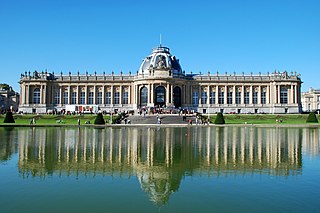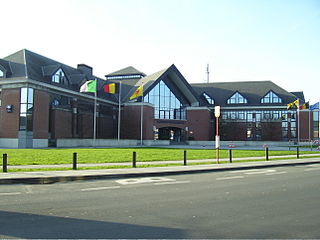
Belgium, officially the Kingdom of Belgium, is a country in Western Europe. The country is bordered by the Netherlands to the north, Germany to the east, Luxembourg to the southeast, France to the southwest, and the North Sea to the northwest. It covers an area of 30,689 km2 (11,849 sq mi) and has a population of more than 11.5 million, making it the 22nd most densely populated country in the world and the 6th most densely populated country in Europe, with a density of 376 per square kilometre (970/sq mi). The capital and largest city is Brussels; other major cities are Antwerp, Ghent, Charleroi, Liège, Bruges, Namur, and Leuven.

Brussels, officially the Brussels-Capital Region, is a region of Belgium comprising 19 municipalities, including the City of Brussels, which is the capital of Belgium. The Brussels-Capital Region is located in the central portion of the country and is a part of both the French Community of Belgium and the Flemish Community, but is separate from the Flemish Region and the Walloon Region. Brussels is the most densely populated and the richest region in Belgium in terms of GDP per capita. It covers 162 km2 (63 sq mi), a relatively small area compared to the two other regions, and has a population of over 1.2 million. The five times larger metropolitan area of Brussels comprises over 2.5 million people, which makes it the largest in Belgium. It is also part of a large conurbation extending towards Ghent, Antwerp, Leuven and Walloon Brabant, home to over 5 million people.

Flanders is the Dutch-speaking northern portion of Belgium and one of the communities, regions and language areas of Belgium. However, there are several overlapping definitions, including ones related to culture, language, politics, and history, and sometimes involving neighbouring countries. The demonym associated with Flanders is Fleming, while the corresponding adjective is Flemish. The official capital of Flanders is the City of Brussels, although the Brussels-Capital Region has an independent regional government. The government of Flanders only oversees the community aspects of Flanders life in Brussels, such as Flemish culture and education.

Ghent is a city and a municipality in the Flemish Region of Belgium. It is the capital and largest city of the East Flanders province, and the third largest in the country, exceeded in size only by Brussels and Antwerp. It is a port and university city.

Lille is a city in the northern part of France, in French Flanders. On the river Deûle, near France's border with Belgium, it is the capital of the Hauts-de-France region, the prefecture of the Nord department, and the main city of the Métropole Européenne de Lille.

The Scheldt is a 350-kilometre-long (220 mi) river that flows through northern France, western Belgium, and the southwestern part of the Netherlands, with its mouth at the North Sea. Its name is derived from an adjective corresponding to Old English sceald ("shallow"), Modern English shoal, Low German schol, West Frisian skol, and Swedish (obsolete) skäll ("thin").

Wallonia is one of the three regions of Belgium—along with Flanders and Brussels.

Tervuren is a municipality in the province of Flemish Brabant, in Flanders, Belgium. The municipality comprises the villages of Duisburg, Tervuren, Vossem and Moorsel. On January 1, 2006, Tervuren had a total population of 20,636. The total area is 32.92 km², which gives it a population density of 627 inhabitants per km².
Articles related to Belgium include:

Waterloo is a municipality in Wallonia, located in the province of Walloon Brabant, Belgium, which in 2011 had a population of 29,706 and an area of 21.03 km2 (8.12 sq mi). Waterloo lies a short distance south of Brussels, and immediately north-east of the larger town of Braine-l'Alleud, the site of the Battle of Waterloo, where the resurgent Napoleon was defeated for the final time in 1815. Waterloo lies immediately south of the official language border between Flanders and Wallonia.

The Workers' Party of Belgium is a Marxist and socialist political party in Belgium. It is one of the few Belgian parties that is a fully national party, representing both Flanders and Wallonia. Having traditionally been a small party, the PTB-PVDA has gained momentum since the 2010's, continuously scoring better at the polls and elections, particularly in Wallonia and working-class communities in Brussels.
Boston University Brussels, officially named the Boston University Brussels Graduate Center, and also known as BUB, was part of Boston University's Metropolitan College (MET), one of seventeen degree-granting colleges that make up Boston University. In 1972 Boston University became the first major American university to offer graduate business management degrees in Europe with the opening of its campus in Brussels, Belgium.
Due to its location in the unofficial capital of Europe, home to the European Union and NATO, the school placed a strong emphasis on international business, and the student body comprised a diverse range of nationalities and cultures. Participants typically had several years of work experience and were often employed by one of the many multinational corporations and government organizations located in the Benelux region. Classes were held throughout the day or during weekday evenings allowing students to earn a graduate degree within 18–24 months while working full-time.
Science and technology in Flanders, being the Flemish Community and more specifically the northern region of Belgium (Europe), is well developed with the presence of several universities and research institutes. These are strongly spread over all Flemish cities, from Kortrijk and Bruges in the Western side, over Ghent as a major university center alongside Antwerp, Brussels and Leuven to Hasselt and Diepenbeek in the Eastern side.

The Francization of Brussels refers to the evolution, over the past two centuries, of this historically Dutch-speaking city into one where French has become the majority language and lingua franca. The main cause of this transition was the rapid, yet compulsory assimilation of the Flemish population, amplified by immigration from France and Wallonia.
Science and technology in Brussels, the central region of Belgium (Europe), is well developed with the presence of several universities and research institutes.

The International School Sport Federation (ISF) is an international sports governing body for school sport. Founded in 1972 with 21 signatory nations, the federation has been organising international competitions to encourage education through sport and student athletes. It has 132 members from five continents.
ISF Waterloo is an international school for young people aged 2 ½ to 18. It is a member of the European Council for International Schools. The campus is located south of Brussels right on the border between the communes of Sint-Genesius-Rode and Waterloo. It currently has over 200 students enrolled, from 49 different nationalities, meaning that classes are usually small. Every one of the teachers is trained in English as an Additional Language. French is taught daily to every student.

The Marie Haps Faculty of Translation and Interpreting is a faculty of Saint-Louis University, Brussels (UCLouvain) located on its own campus in Brussels' European Quarter, in the municipalities of Ixelles and the City of Brussels. It is Belgium's oldest translation school, founded in 1955, and the fifth faculty of Saint-Louis University, Brussels, which it fully merged with in 2015.